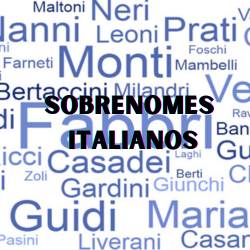Italian surnames
In Italy we have a wide variety of Italian surnames, many of which have historical and geographical roots. Some surnames are common throughout the country, while others are more specific to certain regions.
Italian surnames
There are over 300,000 Italian surnames. A precise calculation is impossible, as over time some have become extinct and others have been formed (usually due to transcription errors at registry offices and "comune").
Apart from the innovations introduced by immigration, almost all are of medieval origin and were established very gradually.
Italian surnames
There are more common and rarer Italian surnames. It all depends on the region of Italian origin.
This also applies to the effects of the immigration that took place in Brazil yesterday as well as the most common surnames in Brazil taken by the Italian citizen when immigrating.
How do I find the origin of my surname?
To find the true origin of your Italian surname, therefore, you need to go back to the roots of the family tree. Where did my grandparents come from? And my grandparents' grandparents?
Although over time certain family rituals have (perhaps) been lost, there is no doubt that this can be started with family stories, because everyone has stories to tell. And this is how entire family trees have been reconstructed, firmly - and proudly - linking the surname to a specific region of Italy.
What are the most common surnames?
Each region of Italy has a number of well-known surnames. Here are some examples of Italian surnames in general:
Rossi
Ferrari
Russo
Esposito
Bianchi
Romano
Colombo
Ricci
Marino
Greco
On the overall podium shown, Rossi wins because families with this surname are the most numerous in many areas. Rossi is actually the most common surname in Veneto, Umbria, Tuscany, Marche and Lazio, i.e. some of the most populous regions in the country.
The overall runner-up, Russo, is the most widespread in the southern regions, holding the lead in Calabria and Sicily. Ferrari, the bronze surname on this ideal podium, is first in Emilia-Romagna, as in Trentino, and second in almost all the other regions of north-central Italy.
It's important to note that this is only a small selection and that there are thousands of different Italian surnames. Furthermore, the distribution of surnames can vary greatly from one region to another. Some surnames may be more common in northern, central or southern Italy.
For Italian surnames in Brazil, see our article.
ITALIAN SURNAMES AND ITALIAN CITIZENSHIP
A very common question we receive is from clients who say they have an Italian surname and want to start the process through the courts and ask: My surname is Italian, can I apply for Italian citizenship?
Having an Italian surname is an indication that your ancestors were Italian and it is likely that you and your family have the right to be recognized as Italians.
I don't have an Italian surname, but my cousin or aunt does, can I also apply for dual citizenship?
Yes, according to Italian law it is not the surname that gives the right to recognition, but the legal right to be the child or children of Italians, which falls to the descendants. Many families have lost their Italian surname over time due to the wife adopting her husband's surname.
Example: Joana Scipioni married André Aguilar. Upon her marriage, she adopted her husband's surname, becoming Joana Aguilar. Do the children of this couple, Julia Aguilar and Diego Aguilar, have the right to citizenship? yes!
For this and as proof of their descent, the law requires them to prove it with documents, Brazilian and Italian certificates. That's why it's so important to build your family tree, and there's no generation limit for such transmission.
I have an Italian surname, but it has changed over the years. Am I entitled to dual nationality?
Yes, having Italian surnames that have changed over time also allows you to start the process. In the past, when Italians landed in Brazil at the ports and were registered in churches and registry offices, the spelling was misspelled and this is still the case in many registry offices.
If I have a double surname, when the documents are transcribed at the Italian comune (which acts as a registry office in Brazil) will they be kept?
When your citizenship is recognized, the same data that appears on the Brazilian certificate will appear on the transcription of the Italian documents. According to the opinion of the Council of State, foreign citizens who acquire Italian citizenship are entitled to full recognition of their original name, i.e. the one they were given at birth. This was clarified by the Ministry of the Interior in Circular 14.424/2013.
How can I get citizenship by surname?


How can I get citizenship by surname?
With all the documentation in hand, Brazilian and Italian certificates, plus the negative naturalization certificate, translated and apostilled documents, you can start the process through the courts.
Studio Legale Italiano
We help our clients with searches, family trees and our main activity of filing a lawsuit in Italy through Italian lawyers. We have helped many families for many years, as can be seen from the various recognition rulings. Book an appointment with us.